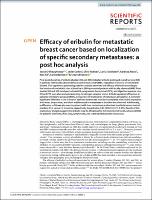Efficacy of eribulin for metastatic breast cancer based on localization of specific secondary metastases: a post hoc analysis

Author
Date
2020-07-08Permanent link
https://hdl.handle.net/11351/6269DOI
10.1038/s41598-020-66980-0
ISSN
2045-2322
WOS
000548300100011
PMID
32641747
Abstract
Prior pooled analysis of eribulin studies (301 and 305) indicated eribulin prolonged overall survival (OS) in patients with locally advanced/metastatic breast cancer (MBC) regardless of visceral or nonvisceral disease. This hypothesis-generating post hoc analysis examined the efficacy of eribulin according to the location of metastatic sites at baseline in 1864 pretreated patients with locally advanced/MBC from studies 301 and 305. Analyses included OS, progression-free survival (PFS), and objective response rate; OS and PFS were also analyzed according to estrogen-receptor status. Eribulin appeared efficacious in patients with locally advanced/MBC, irrespective of the location of metastases at baseline. A nominally significant difference in OS in favor of patients randomized to eribulin compared with control in patients with bone, lymph node, and chest wall/breast/skin metastases at baseline was observed. Additionally, a difference in OS was also seen in patients with liver metastases randomized to eribulin versus control (median: 13.4 versus 11.3 months, respectively; hazard ratio, 0.84 [95% CI: 0.72, 0.97]). Results of this exploratory analysis suggest that eribulin may be efficacious for the treatment of locally advanced/MBC for patients with bone, liver, lung, lymph node, and chest wall/breast/skin metastases.
Keywords
Breast cancer; Predictive markers; PrognosisBibliographic citation
O’Shaughnessy J, Cortes J, Twelves C, Goldstein LJ, Alexis K, Xie R, et al. Efficacy of eribulin for metastatic breast cancer based on localization of specific secondary metastases: a post hoc analysis. Sci Rep. 2020 Jul 8;10:11203.
Audience
Professionals
This item appears in following collections
- VHIO - Articles científics [1250]
The following license files are associated with this item:

 Private area
Private area Contact Us
Contact Us






